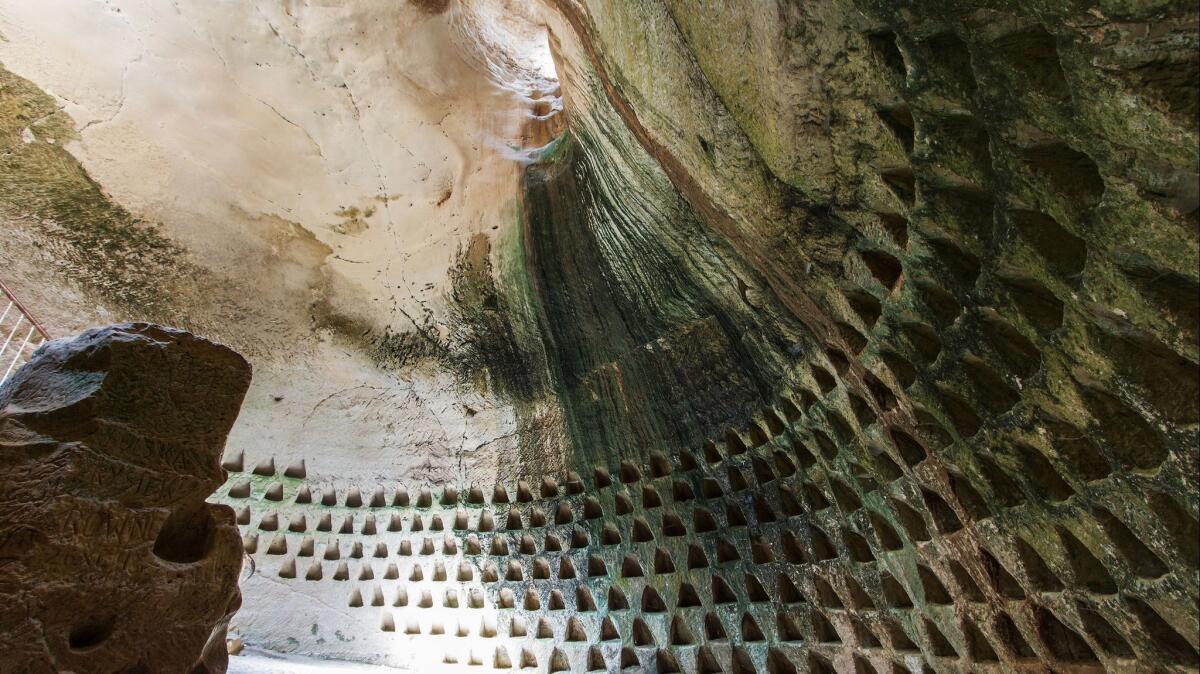I was always a chicken. My Israel trip changed that, thanks to a camel and a cave

- Share via
I have always been a coward. When my husband’s Israeli cousin asked when I was going to visit his country, I told him I was afraid to go.
But when our rabbi announced he was planning a trip to Israel in 2013, the emotional pull of visiting the Holy Land outweighed my fears.
Speaking at a travel show, guidebook author, TV personality and tour leader Rick Steves once said he didn’t want grouches on his trips. I decided I wouldn’t be the Israel trip complainer. Anything my fellow travelers did, I would do. I would not be a wuss.
We flew El Al, on which the pre-boarding security was reassuringly thorough. Each of us was carrying several prayer books to donate to a synagogue. When the boarding agent asked whether anyone had given us anything to carry, I said, “No.”
“Your rabbi didn’t give you books?” I was asked.
“Yes, but he’s not a stranger,” I replied. I was allowed to board.
Once in Israel, I faced my first test of bravery when we rafted the Jordan River. Ordinarily, I would have been afraid. Could I get in and out of the raft? Realizing I wouldn’t be left in that raft forever, that someone would help me get in and out, I climbed in.
“I am not a wuss,” I repeated out loud. Then I enjoyed the ride.
Before this trip, I would never have ridden a camel. At Genesis Land, whose website describes it as a place where visitors can “experience life as it was in biblical times,” everyone rode camels to Abraham’s Tent, where we would have dinner.
A friend had once posted on Facebook a picture of himself riding a camel. He lived to tell about it, so I decided I would do it too. (Postscript on that: That friend later posted a Facebook “memory” about the runaway camel he had ridden. Had I known runaway camels were a thing … well, I’m glad I didn’t know.)
The most adventurous part of the trip occurred in the caves of Bet Guvrin National Park. First, we participated in a dig uncovering pottery from the Hellenistic period about 2,300 years ago. After that, we could go spelunking in a cave or sit under a pop-up tent waiting for the others to finish. Newly courageous, I chose spelunking.
A baseball trip through Japan is just what a jaded MLB fan needed »
The cave where the dig took place was well-lighted. You went only into the first room. The spelunking cave was more treacherous. We had to light candles that sat in holes in the walls as we made our way. Once I had begun, there was no turning back.
I was the slowest one of our group, but I eventually arrived at a hole, about 2 feet in diameter, through which I was somehow supposed to lower myself. It was completely dark beneath the hole. I couldn’t tell how far I would drop. I wasn’t even sure I would fit through the hole.
I yelled for the guide, who had gone ahead. She returned with her flashlight, and I could see below. No longer a wuss, I lowered my feet into the hole and wiggled to the ground, feeling as though I had been born again. I navigated the rest of the cave by crawling, walking and scooting on my tush.
Waiting near the exit, our group cheered for me. At the pop-up tent, those who heard the story of my bravery gave me a standing ovation.
Phu Quoc is now a global destination. Is that a good thing? »
We saw and did amazing things on that trip. We met 30 relatives and U.N. peacekeepers, floated on the Dead Sea, heard our voices echo from the valley below Masada and much more.
The trip was life-changing. Not only did I find my repository of bravery, but so did my friends. Last winter, when a California friend visited her grandchildren in New York, she had to drive one of them to preschool in the snow.
As she drove, she repeated, “I am not a wuss.”
You should try it sometime.
Departure Points explores the ways traveling changes us, whether it’s a lesson learned or a truth uncovered. You may submit a first-person essay of 700 or fewer words to travel@latimes.com using “Departure Points” in the subject line. Please include your first and last names and your contact information for editorial consideration.
More to Read
Sign up for The Wild
We’ll help you find the best places to hike, bike and run, as well as the perfect silent spots for meditation and yoga.
You may occasionally receive promotional content from the Los Angeles Times.






